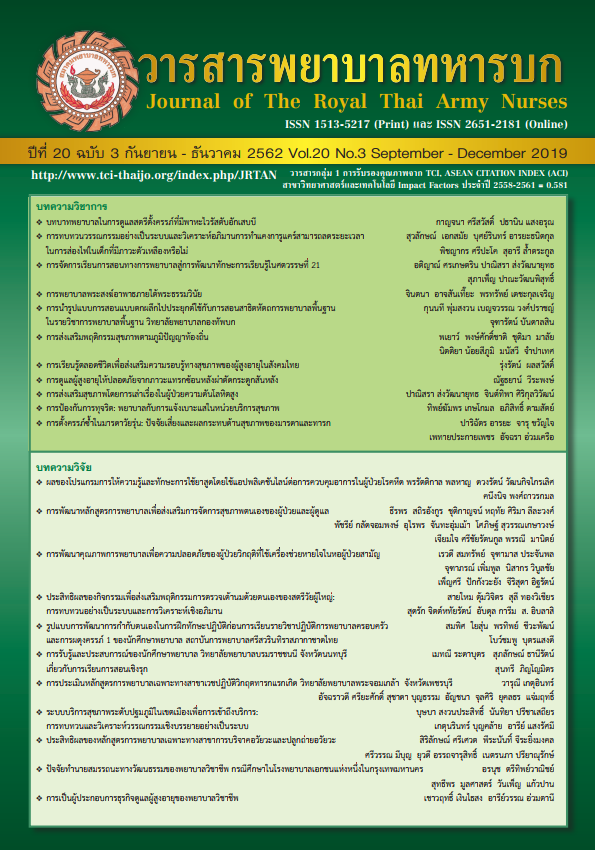Nursing Curriculum Development to Promote Healthcare Self-management in Patients and Caregivers
Keywords:
Nursing Curriculum, Self-management, Patients, CaregiversAbstract
The purpose of this study was to develop nursing curriculum to promote healthcare self-management of patients and their caregivers. The process for conducting this study, based on adult learning concepts and Tyler’s curriculum development, consisted of 3 phases: 1) Situation analysis; 2) Curriculum development; and 3) Curriculum implementation and modification. The sample composed of 70 nurses from Ministry of Public Health hospitals. The research instruments included assessment of curriculum structure, knowledge assessment form and questionnaire of satisfaction towards training program. The research tools were tested for content validity by 5 experts. The KR – 20 reliability test for knowledge testing was 0.75 and satisfaction evaluation form which the Cronbach’s alpha coefficient was 0.86. Data were analyzed using mean, standard deviation and t-test.
The result revealed that the curriculum consisted of 6 modules. Course performance was rated as the most suitable aspect yielding the consistency index of 1.00. Evaluation of curriculum implementation found that the mean score on knowledge of the nurses after received training was higher than before received training with statistical significance (p < 0.01). The nurses were also satisfied with the curriculum at a high level. It was implied that the course was quite suitable and reliable to apply in the setting. Therefore, the Ministry of Public Health should encourage the nurses attending this course to promote healthcare self-management in patients and caregivers.
Downloads
References
2. Strategic and Planning Division, Office of the Permanent Secretary. Summary of Important Health Statistics in Year 2013. (in Thai).
3. Ryan P, Sawin K J. The individual and family self-management theory: Background and perspectives on context, process, and outcomes. Nursing outlook 2009; 57(4):217-225.
4. Wattana C. Handbook of guidelines for applying self-management theories to practice in enhancing the self-health management of the people. (Duplicate). 2019. (in Thai).
5. Thailand Nursing and Midwifery Council. Professional Nursing and Midwifery Act. Vol.2 (1985) and Amended by Professional Nursing and Midwifery Act Professional Nursing and Midwifery Act. Vol.2 (1997). 2nd Edition. Bangkok: Golden Point Co.Ltd (in Thai).
6. Srisuphan W, Senarat W, Nuntabud K. Health Promotion Innovation, under Nursing Professional Role. Nursing Professional’ Drive for Health Promotion. (2nd Edition). Bangkok: Mata Publishing, Co.Ltd. 2016. (in Thai).
7. Knowles, M.S. The modern practice of adult education: From pedagogy to andragogy. New York: Cambridge, the Adult Education Company. 1980.
8. Tyler, R.W. Education 206: Basic Principles of Curriculum and Instruction. University of Chicago Press, Chicago, 1949.
9. Petpichetchian W. Health Promotion: Nursing Role. Bangkok: Mata Publishing, Co.Ltd. 2016. (in Thai).
10. Ian Scott, Debbie Mazhindu. Statistics for Healthcare Professionals An Introduction. (2nd Edition). Singapore: SAGE Publications Asis-Pacific Pte Ltd. 2014.
11. Songwatthanayuth P, Polin S. The Curriculum for Nursing Students in the 21st Century: Case study and Transformative Learning. Journal of The Royal Thai Army Nurses 2019;20 (2): 10-16. (in Thai).
12. Sathira-Angkura T. Ministry of public health reform and mechanism in nursing service quality development of regions. Journal of Nursing Division 2013; 40 (3): 1-8.
13. Chunthai K, Haruthai C, Sathira-Angkura T, Suwonkesawong S, Kwansathapornkul K. Model Development of Chief Nursing Officer’ s Network for Health Promotion. Journal of The Royal Thai Army Nurses 2018; 19 (1): 241-252 (in Thai).
Downloads
Published
How to Cite
Issue
Section
License
บทความหรือข้อคิดเห็นใดใดที่ปรากฏในวารสารพยาบาลทหารบกเป็นวรรณกรรมของผู้เขียน ซึ่งบรรณาธิการหรือสมาคมพยาบาลทหารบก ไม่จำเป็นต้องเห็นด้วย
บทความที่ได้รับการตีพิมพ์เป็นลิขสิทธิ์ของวารสารพยาบาลทหารบก
The ideas and opinions expressed in the Journal of The Royal Thai Army Nurses are those of the authors and not necessarily those
of the editor or Royal Thai Army Nurses Association.






